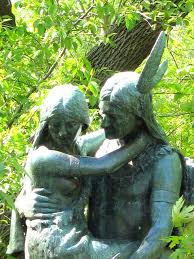Wishing to start an utopian community, three Hutchinson brothers—Asa, Judson, and John—travel west to Minnesota. On the Crow River they help found the town of Hutchinson and commit it to the values of education, equality, and temperance. The popular Hutchinson Family Singing Troupe promotes these same principles as they tour.
Abby, John, Judson, and Asa—4 of the 13 brothers and sisters—are the Hutchinson Family Singers. Called “the best known troupe of family singers in the country,” the Hutchinsons sing and compose songs about American life that often carry a social message.*
Lord, thanks for the memories of this family. Thank you for their persistence in using their gift of song and entertainment for good, rather than their own fame. May You release many of this generation to be so moved and committed to You! Thank you for the good You do for us through both the enjoyment of making and listening to music!
Father, forgive the judgments we’ve made towards each other on the basis of position towards alcohol. Especially during this era of temperance, Minnesotans who drink have judged non-drinkers, and vice versa. Will You forgive our disrespect of the positions of others and their cultures of origin? For example, the Germans of southern Minnesota had no conflict or fear of drinking beer. Many agreed with Martin Luther’s famous quote that “beer is proof that God loves us and wants us to be happy.” Will You give us the power to not use alcohol abusively in this generation, but to savor it properly? Will You give us faith that You are our brother’s keeper, so we don’t have to jerk his chains?
Will You release us from the bitter roots of alcoholism, and the effect it has had on the individuals, families, cities, counties, tribes, and nations that make up our state? Will You release from any residue of the self-righteous judgments of those who led the temperance movement from a heart of legalism and pride over real love for their neighbors? Sometimes we do good with a bad heart. Will You give us humility to deal with the sensitive spots in the conscience of our fellow man according to Your merciful example?
“A bruised reed he will not break, and a smoldering wick he will not snuff out. In faithfulness he will bring forth justice;” Isaiah 42:3
*Note – PrayThroughHistory uses the timeline located for several years at the Minnesota Historical Society Web site, at this URL: mnhs.org/about/dipity_timeline.htm .



